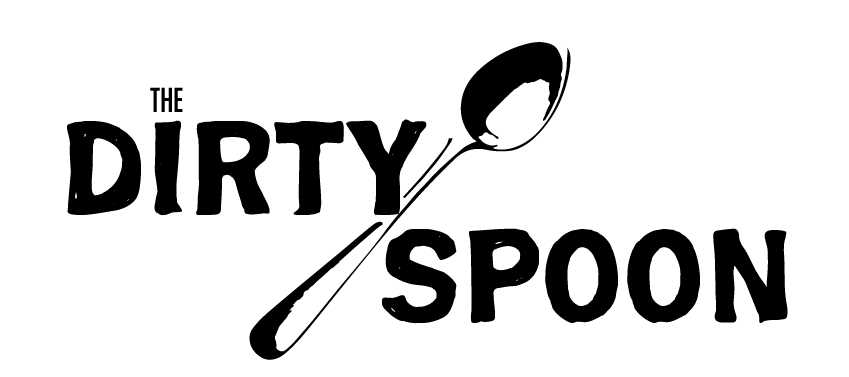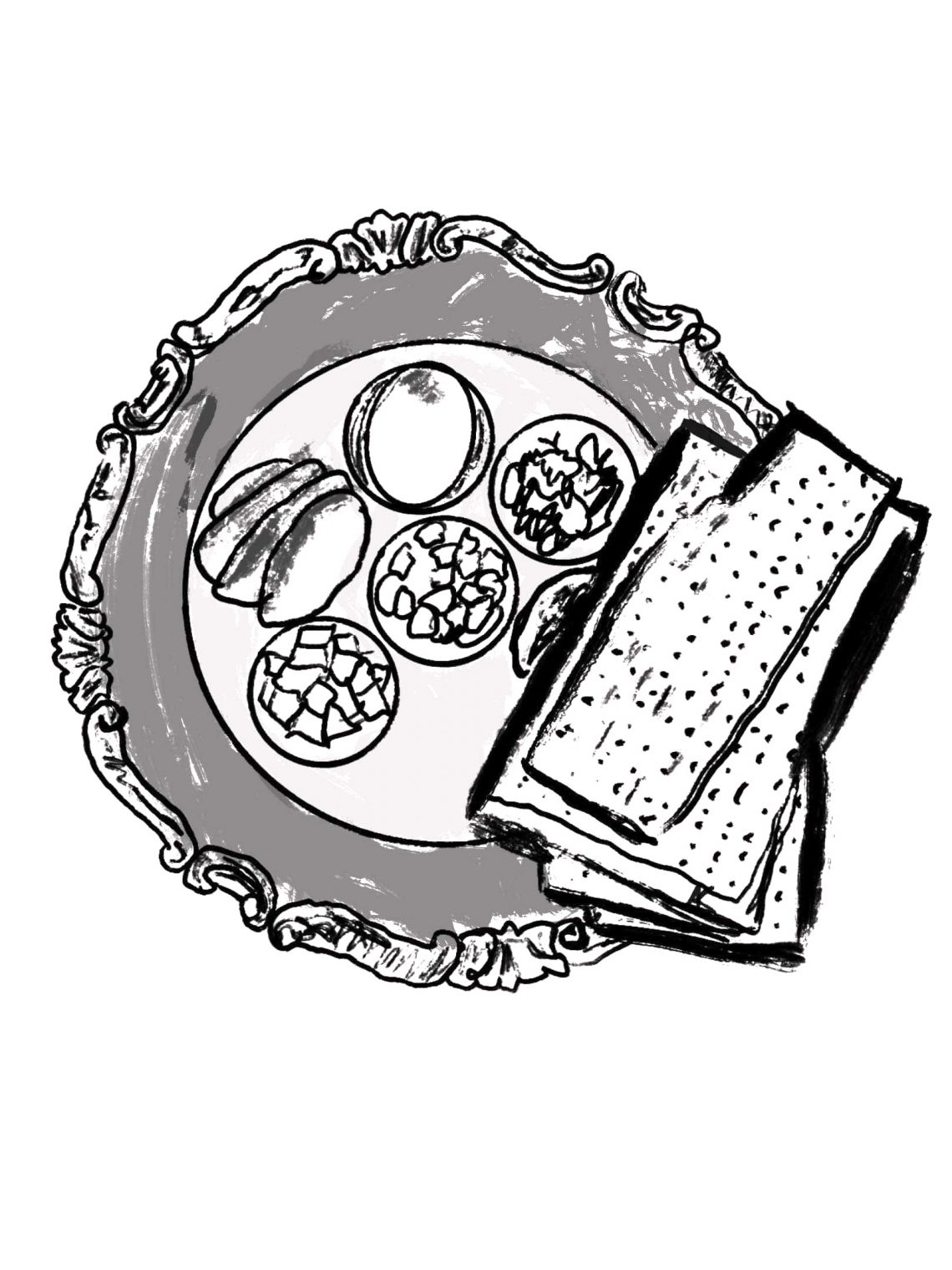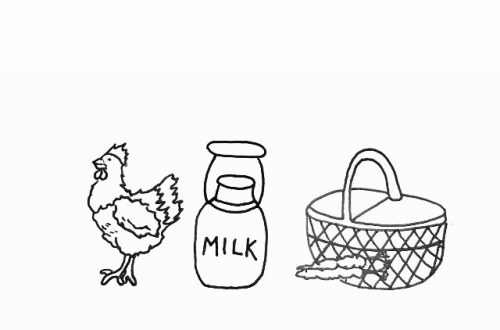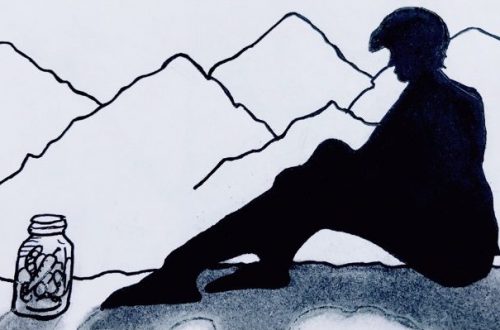by Sabena Stark
Sabena’s essay was originally published in Hippocampus Magazine and is featured in episode 47 of The Dirty Spoon Radio Hour.
Seder Night
One of us was going to get smacked. My sister Susie and I knew it and were kicking each other under the table to keep from laughing because… what else could we do? My father stood, his yarmulke resting on top of his head, as he chanted in his usual agile style through the Hebrew text of the forty-nine-page Rabbi Nathan Goldberg Passover Haggadah. He glared down at us periodically, without missing a word, with a look that said, “If you touch any of that food before I finish, you’ll be sorry.”
It was six-thirty on the eve of Passover, 1959, almost 13 years after my parents arrived in New York from a displaced persons camp in Munich. We were seated in our apartment kitchen where the table stood just a few feet from the stove. Winter had melted away and the light of the brilliant first full moon of spring would soon pour in through the kitchen window. My mother moved quickly, her cotton apron wrapped around her housedress. She had already set down bowls in front of us filled with chicken soup, its rich broth buoying up islands of matzah balls and shimmering sweet onion. Two white candles glowed in their holders in the center of the table.
“Eat. Eat before it gets cold,” she said. My mother had devoted the day to preparing our dinner and the appropriate ceremonial foods. The mound of kharoses, made of hand-chopped walnuts and apples soaked in sweet grape wine, sat untouched in a serving dish. Beside it was a plate of still-warm gefilte fish, each piece topped with its own yarmulke of cooked sliced carrot. Nearby, a bright yellow-fringed, white satin matzah cover with three paper-thin pockets lay flat. My mother had tucked a big square of salted matzah into each of these pockets. In the space in front of my father sat the designated Seder plate, an otherwise ordinary dinner dish, displaying the other symbolic foods: a roasted lamb shank-bone and egg, a sprig of parsley, the pungent horseradish, and a dollop of the apple and walnut mixture. The luscious scents from the simmering pot of soup on the stove and the bowls and plates of food before us interfered with any other thoughts. We were hungry and the aromas were dizzying.
My sister, at almost eleven years old, was quiet; she planned her words and actions carefully. Her large hazel eyes drank in the world with the seriousness of someone in charge. My father adored and, in many ways, counted on my sister. In contrast to her, I was intrepid, talkative, and trusting. For the five years following my sister’s birth, my father had hoped for a son, an after-the-war replacement child for his little boy whose life, along with the life of his first young wife, was extinguished by the war.
But I was a second girl. My sister sometimes called me “Daddy Face,” because I inherited my father’s eyes and his smile, as well as elements of his temperament. My father had lightened the burden of his memories with spiritual pearls he drew from kheyder, his boyhood religious school, and from his family’s strong prewar Jewish observances. He tried to teach me to surrender to a God whose actions couldn’t be explained and whose demands couldn’t be questioned. When, as a small child, I asked him, “Who made God?”, his answer was an immediate, painful rebuke. I remembered not to ask again. My mother, meanwhile, made fun of the earnestness with which I engaged in Jewish religious practice and prayers even at six years old. Her upbringing made her question the benefit of our traditions. But it was my spiritual inheritance from him.
As the youngest member of the household, it was my job to intone the Fier Kashes, or Four Questions, early in the Seder, soon after we blessed and drank the first of four required glasses of wine. And so, I began in my thin, childish soprano to sing out the first inquiry.
“MAH… nishtana haleila ha-ZEH…mi-KOL ha-lay-LOHT?” [WHY is THIS night different from ALL other NIGHTS?] My sister read along in the Haggadah in case I made a mistake so she could have the pleasure of correcting me.
The Four Questions were printed in type twice the size of the other texts in the Haggadah, in bold, simply shaped Hebrew letters meant for children to read. Some of the lines were more difficult to sing than others. “Sheb-eh-KHOL ha-lay-LOHT an-u okh-LEEN…” [On ALL other nights (we eat either leavened or unleavened bread)] … Longer phrases had to be squeezed into the same melodic line as the short ones and they were a bit of a tongue-twister. But I had practiced. When the final words squeaked out of my lips, “…haleila ha-ZEH… koo-LAAH-noo mi-SOOO-beeen” [on THIS night we ALL RECLINE], I felt successful.
Fortunately, my mother was facing the kitchen counter and didn’t interrupt my performance. As always, she had as much patience for my singing this evening as she had for my father’s. Her focus remained on delivering our dinner. She filled a bowl with glistening browned potatoes from the roasting pan and ferried it to the table.
When I was done, my father kissed the top of my head and then launched into the answer: the Hebrew liturgy of the Exodus story, our escape from slavery to freedom. But as soon as he opened his mouth, my mother looked over her shoulder and confronted my sister and me again.
“What are you two waiting for? Everything’s getting spoiled!” My father continued to murmur the rolling passages of Hebrew as we sat quietly, staring at the fragrant offerings in front of us. The roast chicken, meanwhile, had been cooling on a serving dish on the counter. My mother started cutting it up and placing pieces on our plates.
“Hurry up! Finish already!” she fired at my father. But he wouldn’t stop. Why did she agree to marry this man who, like her, had lost everyone and everything but had nothing else in common with her? He rocked slowly where he stood and chanted with greater intensity. He flashed an angry look in her direction between the words. I was getting nervous. I picked up my spoon but didn’t touch the food. My father frowned. I started to giggle but my sister stopped me with a pinch.
My mother turned to my sister and me. “Enough. What are you two smiling about?” Under the table, I swung my leg to the side and kicked my sister as hard as I could, hoping she would say something to placate my parents. But she didn’t say a word. Instead, she kicked me back. I stifled my reaction to avoid drawing more attention from them to us.
We could hear drunks shouting from downstairs, outside the bar at the base of our building. My father kept chanting from the Haggadah, increasingly faster, page after page. When it was time to recite the blessing over the next serving of wine, he raised his adult wineglass, and we raised our tiny child-sized ones, all of us sipping at the fiery-sweet liquid. He then set his glass down and dipped his pinky into the remaining wine to extract one drop at a time as he called out the ten plagues that befell the Egyptians, to acknowledge their suffering: blood, frogs, vermin, beasts, cattle disease, boils, hail, locusts, darkness, and the worst and final plague, the slaying of the first-born. We followed along, dripping wine onto our plates and surreptitiously licking the drops from our fingers.
Now he chanted the rabbinical arguments about the meaning of the plagues and the liberation of the Israelites. How thankful we must be to God! Dayeinu, if God had only liberated us, it would have been enough! It would have been enough for my mother if the Seder had ended as soon as it began. But it was time to taste the bitter herbs and matzah and cry the tears of slavery.
My father held up a small bowl filled with pungent horseradish and chanted in Hebrew. “These bitter herbs which we eat—what is their meaning? They are eaten to recall that the Egyptians embittered the lives of our forefathers in Egypt, as it is written, ‘And they embittered their lives with hard labor: with mortar and bricks, with every kind of work in the fields; all the work which they made them do was rigorous,’” Each line he sang collided with my mother’s protests.
Finally, the crescendo of my mother’s frustration reached its peak and her voice rose. “Are you mocking me? The food is destroyed! Eat your dinner!” I looked up at my father, who was still praying in earnest, then at my mother, who was hovering over us, glaring at the food on our plates that we didn’t dare eat. A laugh came bursting out of my mouth.
And here came the smack. My mother ran out of patience with my father, with God, with Rabbi Nathan Goldberg’s overlong Haggadah, and especially with her two daughters. Between my sister and me, the one whose face was closest to her would be the first recipient of her fury. It didn’t matter which one. Her small, hot palm landed on my cheek and left eye. The sting was shocking and I let out a yell. My father, still chanting, paused long enough to shove my mother out of the way. And then it began. Happy Passover! She threw a serving spoon at him, along with several curses. And in return, he struck her and she landed on the floor, crying and sobbing, “See what he does to me!”
Susie froze and I shrieked. I hoped that if I cried loud enough, they would stop fighting. But they didn’t. The invectives came flying and, despite my mother’s rage, she couldn’t overpower my father. She lunged at him, but he propelled her across the room with one short, muscular arm.
“Meshugenah Rosa! Sit down!” He invoked the name of my mother’s aunt Rosa, who had died of a brain tumor soon after arriving in New York with my parents in 1946. Rosa had gone meshuga, crazy, before the cancer took her life. With Rosa’s spirit in the room, my mother’s Yiddish curses began.
“Your face should burn in Hell. You’ve ruined my life!” she yelled back. “What do I need you for? You’ve destroyed me! Take your stupid Passover and kill yourself with it!” She grabbed a heavy plate from the counter and flung it at him. The dish missed his head by inches and shattered on the linoleum floor. He stepped around the table and, with his wide hand, slapped her across the face.
“Quiet, you crazy woman. You don’t know what you’re saying.”
“”I know! I know plenty,” she screamed at him. “I know everything.” Then she collapsed, whimpering into her hands.
As I look back at this evening and the Seders that followed, I realize that although my mother didn’t comprehend more than a few words of the Hebrew text, the meaning and the irony of the Exodus story was not lost on her. But unlike my father, she couldn’t forgive God for the cruelty and indifference she had suffered. She bore the unbearable, the irreparable. Hitler’s murder of her first precious daughter was a fact she told us but never explained. Instead, from my earliest memory, she relived this loss each day like a detonation. During the Passover festival, my mother went through the motions, but she refused to waste her gratitude on a heartless Ruler of the Universe. My father’s prayers only amplified her helplessness.
Seeing my parents fight and my mother so vulnerable and humiliated was terrifying. I wanted to protect her. But it would have been easier to protect an injured panther. If only I could anticipate the forces that set their outbursts in motion, to divert them before the explosion fully blossomed. But I knew without fully understanding that this fight was not about our dinner getting cold. It was about something else, something dreadful and more potent. Something unspoken.
If through some miracle we could have postponed the eruption that night until my mother downed at least two of the four glasses of wine, we might have enjoyed a halfway peaceful night. We could count on the wine to make my mother sleepy and send her to bed. But the way my parents expressed their inner lives, like a sudden brawl on the street below, was unpredictable.
And yet, when the fight ended, we settled into a state of equanimity. The emotions had been wrung out of all of us. Soon, the shock of disruption dissipated. For the rest of the evening, a type of deep peace settled in. Even as a small child, I knew how to blot out the bad things I had only just experienced. The first half of the Seder was complete and it was time for the meal. My mother’s efforts would not be wasted. We had a feast to consume and receive comfort from.
Once we began to eat, we relaxed into the real Seder, the one that made sense, the one I loved and wanted to remember, the one my father intended for us. Because my father had found his way back to the God of his childhood, back to the faith that sustained him. Abundant tears of fury and grief would often flood his life, but not tonight. This night was a celebration. A new family, an enduring ritual, the miracle of life.
As we ate, my father recounted stories leading up to and following the Exodus. No longer reading from the Hebrew Haggadah, he told these tales in Yiddish dotted with fragments of English, the interwoven language we spoke at home and that I understood. My father seemed to know all the principal characters of these stories as if they had been his neighbors. He could list the patrilineal lineage of nearly every human in the Hebrew tribe, from Adam to the great pitcher, Sandy Koufax. There was more wine and lots of sweets: Passover sponge cake and coconut macaroons and brightly colored fruit jellies. At the appointed time, I swung open the apartment door to welcome in the prophet Eliyahu and looked to see if he had sipped at his glass of Mogen David wine sitting on the now wine-stained tablecloth. There was no expectation of going to sleep at a preordained hour, so the evening rolled on at its own pace.
The wine took its effect for my mother. She trundled off to bed early, leaving my sister and me to soak up the tales and sing the Passover songs that my father had sung since his earliest youth. My child’s high voice opened unrestrained, entwined with the voices of my father and my sister, the music warming and healing every cell of my body from the inside out. The screaming curses, the slaps, the things that were broken, all receded to the distant land of memory when at last, sated with scrumptious food and melodies and stories, I, too, wandered off to bed.
Original artwork by Alex Knighten
About the Author
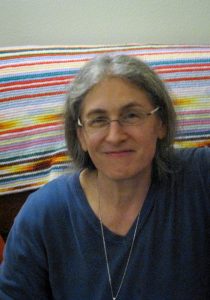 Sabena Stark writes fiction, creative nonfiction, poetry, and music. A daughter of immigrants, she is inspired by people who experience the world as outsiders. Her work appears in The Carolina Quarterly, Georgetown Review, Bridges Journal, and other journals and anthologies. Sabena’s musical composition, “Learning How to Fly,” was recorded by Tuck and Patti (Sony/Epic) and is performed around the world. Her memoir in progress was awarded the Oregon Literary Arts Fellowship for Literary Nonfiction. She lives and writes in Eugene, Oregon.
Sabena Stark writes fiction, creative nonfiction, poetry, and music. A daughter of immigrants, she is inspired by people who experience the world as outsiders. Her work appears in The Carolina Quarterly, Georgetown Review, Bridges Journal, and other journals and anthologies. Sabena’s musical composition, “Learning How to Fly,” was recorded by Tuck and Patti (Sony/Epic) and is performed around the world. Her memoir in progress was awarded the Oregon Literary Arts Fellowship for Literary Nonfiction. She lives and writes in Eugene, Oregon.
